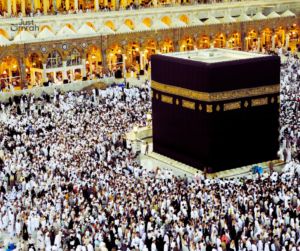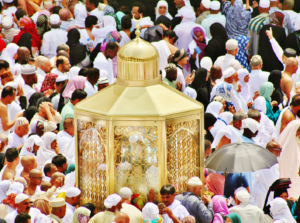Umrah, also known as the “minor pilgrimage,” is a religious rite performed by Muslims from around the world. It is an optional pilgrimage that can be undertaken at any time of the year, as opposed to the mandatory annual hajj pilgrimage, which takes place during specific dates in the Islamic calendar.
The rituals of umrah are like those of hajj, but on a smaller scale. Both pilgrimages involve a series of physical and spiritual acts, including wearing special garments, performing prescribed rituals at various holy sites in Mecca and Medina, and reciting specific prayers and supplications.

The first step in the umrah pilgrimage is entering the state of ihram, which involves a cleansing ritual and the donning of the ihram garments. These garments consist of two white sheets, one wrapped around the waist and the other draped over the shoulder. This signifies a state of purity and equality among all pilgrims, regardless of their social status or wealth.
Next, the pilgrim begins the journey to Mecca, the holiest city in Islam. Upon arrival, the pilgrim performs the tawaf, which involves circumambulating the Kaaba, the holiest site in Islam, seven times in a counterclockwise direction. The Kaaba is a large, cube-shaped structure located in the center of the Grand Mosque in Mecca. It is believed to have been built by the prophet Abraham and his son Ishmael as a place of worship for monotheistic people.

After completing the tawaf, the pilgrim performs the sa’i, which involves walking back and forth seven times between the hills of Safa and Marwah. This ritual commemorates the story of Hagar, the wife of Abraham, who is said to have searched for water in the desert to quench the thirst of her son Ishmael.
The final ritual of the umrah is the cutting or shaving of the hair, symbolizing the completion of the pilgrimage and the shedding of one’s ego. After completing these rituals, the pilgrim is considered to have completed the umrah and is free to return home.
For many Muslims, the umrah pilgrimage is a deeply meaningful and spiritual experience. It is an opportunity to reconnect with their faith and to seek forgiveness and blessings from God. It is also a chance to experience the sense of unity and community that comes from performing the same rituals with millions of other believers from around the world.






